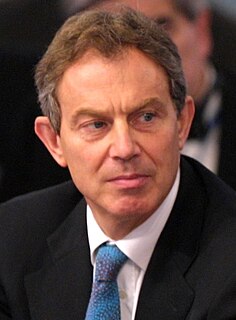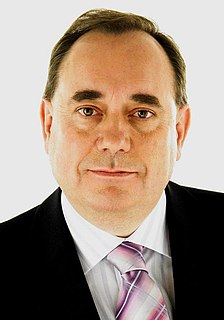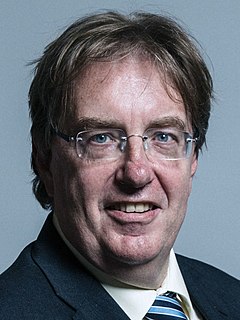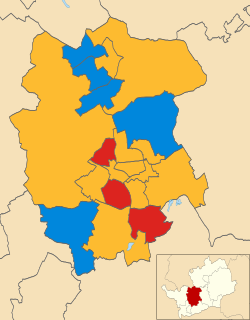
The 2001 United Kingdom general election was held on Thursday 7 June 2001, four years after the previous election on 1 May 1997, to elect 659 members to the House of Commons. The governing Labour Party was re-elected to serve a second term in government with another landslide victory with a 167 majority, returning 412 members of Parliament versus 418 from the 1997 general election, a net loss of six seats, though with a significantly lower turnout than before—59.4%, compared to 71.3% at the previous election. The number of votes Labour received fell by nearly three million. Tony Blair went on to become the first Labour Prime Minister to serve two consecutive full terms in office. As Labour retained almost all of their seats won in the 1997 landslide victory, the media dubbed the 2001 election "the quiet landslide".

The 1997 United Kingdom general election was held on 1 May 1997. The governing Conservative Party led by Prime Minister John Major was defeated in a landslide by the Labour Party led by Tony Blair, achieving a 179 seat majority.

The 1987 United Kingdom general election was held on Thursday, 11 June 1987, to elect 650 members to the House of Commons. The election was the third consecutive general election victory for the Conservative Party, and second landslide under the leadership of Margaret Thatcher, who became the first Prime Minister since the Earl of Liverpool in 1820 to lead a party into three successive electoral victories.

Canvassing is the systematic initiation of direct contact with individuals, commonly used during political campaigns. Canvassing can be done for many reasons: political campaigning, grassroots fundraising, community awareness, membership drives, and more. Campaigners knock on doors to contact people personally. Canvassing is used by political parties and issue groups to identify supporters, persuade the undecided, and add voters to the voters list through voter registration, and it is central to get out the vote operations. It is the core element of what political campaigns call the ground game or field.

"Get out the vote" or "getting out the vote" (GOTV) describes efforts aimed at increasing the voter turnout in elections. In countries that do not have or enforce compulsory voting, voter turnout can be low, sometimes even below a third of the eligible voter pool. GOTV efforts typically attempt to register voters, then get them to vote, by absentee ballot, early voting or election day voting. GOTV is generally not required for elections when there are effective compulsory voting systems in place, other than perhaps to register first time voters.
A voter database is a database containing information on voters for the purpose of assisting a political party or an individual politician, in their Get out the vote (GOTV) efforts and other areas of the campaign.

The 2005 United Kingdom general election was held on Thursday 5 May 2005, to elect 646 members to the House of Commons. The Labour Party, led by Tony Blair, won its third consecutive victory, with Blair becoming the second Labour leader after Harold Wilson to form three majority governments. However, its majority fell to 66 seats compared to the 167-seat majority it had won four years before. This was the first time the Labour Party had won a third consecutive election, and remains the party's most recent general election victory.

The 2010 United Kingdom general election was held on Thursday 6 May 2010, with 45,597,461 registered voters entitled to vote to elect members to the House of Commons. The election took place in 650 constituencies across the United Kingdom under the first-past-the-post system.

The 2007 Scottish Parliament election was held on Thursday 3 May 2007 to elect members to the Scottish Parliament. It was the third general election to the devolved Scottish Parliament since it was created in 1999. Local elections in Scotland fell on the same day.

An election to the Assembly of London took place on 1 May 2008, along with the 2008 London mayoral election. The Conservatives gained 2 seats, Labour gained one seat, the Liberal Democrats lost two seats, and UKIP were wiped out. Notably, a candidate for the British National Party (BNP) was elected for the first time.

The 2008 Henley by-election to elect a member of the British House of Commons for the constituency of Henley in Oxfordshire was held on 26 June 2008. It followed the election of Boris Johnson as Mayor of London in May 2008. In order to resign from being an MP, Johnson accepted the post of Steward and Bailiff of the Manor of Northstead on 4 June 2008.
The 2007 council elections in Guildford saw the Conservatives retain control over Guildford Borough Council. Full results for each ward can be found at Guildford Council election, full results, 2007.
Electoral reform is a change in electoral systems which improves or worsens how public desires are expressed in election results. That can include reforms of:

The 2003 St Albans City and District Council election took place on 1 May 2003 to elect members of St Albans District Council in Hertfordshire, England. One third of the council was up for election and the council stayed under no overall control.

There are five types of elections in the United Kingdom: elections to the House of Commons of the United Kingdom, elections to devolved parliaments and assemblies, local elections, mayoral elections, and Police and Crime Commissioner elections. Within each of those categories, there may also be by-elections. Elections are held on Election Day, which is conventionally a Thursday, and under the provisions of the Dissolution and Calling of Parliament Act 2022 the timing of general elections can be held at the discretion of the Prime Minister during any five-year period. All other types of elections are held after fixed periods, though early elections to the devolved assemblies and parliaments can occur in certain situations. The five electoral systems used are: the single member plurality system (first-past-the-post), the multi-member plurality system, the single transferable vote, the additional member system, and the supplementary vote.

The United Kingdom Alternative Vote referendum, also known as the UK-wide referendum on the Parliamentary voting system was held on Thursday 5 May 2011 in the United Kingdom (UK) to choose the method of electing MPs at subsequent general elections. It occurred as a provision of the Conservative–Liberal Democrat coalition agreement drawn up in 2010 and also indirectly in the aftermath of the 2009 expenses scandal. It operated under the provisions of the Parliamentary Voting System and Constituencies Act 2011 and was the first national referendum to be held under provisions laid out in the Political Parties, Elections and Referendums Act 2000.

These are the results of the 2010 United Kingdom general election in Scotland. The election was held on 6 May 2010 and all 59 seats in Scotland were contested. The election result in Scotland was unusual in that there wasn't any change of seats from the 2005 general election, although the Labour Party took back two seats that it had lost in by-elections. This was the most recent general election at which the Labour Party won a majority of seats and plurality of votes in Scotland.

The 2007 National Assembly for Wales election was held on Thursday 3 May 2007 to elect members to the National Assembly for Wales. It was the third general election. On the same day local elections in England and Scotland, as well as the Scottish Parliament election took place. This election was preceded by the previous Assembly election in 2003.

The 2019 United Kingdom general election was held on Thursday, 12 December 2019. It resulted in the Conservative Party receiving a landslide majority of 80 seats. The Conservatives made a net gain of 48 seats and won 43.6% of the popular vote – the highest percentage for any party since 1979.

The Richmond Park by-election was a UK parliamentary by-election in the constituency of Richmond Park which was held on 1 December 2016. It was triggered by the resignation of the Conservative Member of Parliament Zac Goldsmith on 25 October 2016 over the Government's proposal for a third runway at the nearby Heathrow Airport. It was won by Sarah Olney of the Liberal Democrats, after a campaign focused on opposition to Brexit.















